A Political Cabinet in Disarray
How did Prabowo Subianto decide on the composition of his cabinet? There are indications that several prospective ministers were proposed by tycoons.
maaf email atau password anda salah
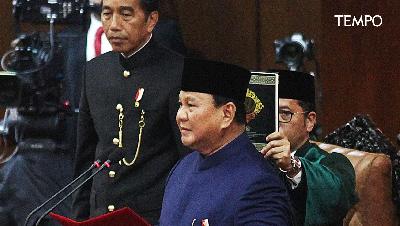
How did Prabowo Subianto decide on the composition of his cabinet? There are indications that several prospective ministers were proposed by tycoons.

Prabowo Subianto formed a large cabinet to accommodate the interests of parties, businessmen, and his supporters. Mining entrepreneur Haji Isam is suspected of proposing several ministerial candidates.
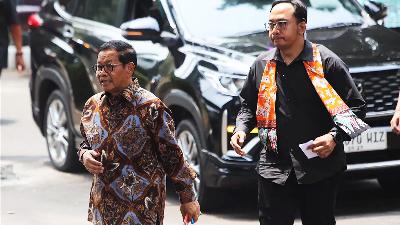
Megawati reportedly did not approve of PDI-P cadres entering Prabowo’s cabinet. She chose Pramono Anung to communicate with Prabowo.

Prabowo Subianto is to form a cabinet comprising numerous ministers. This is made possible through a revision of the law.

President-elect Prabowo’s cabinet is predicted to be filled by more than 40 ministries in an effort to accommodate the interest of the parties supporting him.

The illegal trade in rhino horns continues even though it is often foiled. This is proof of the weak protection of rhinos in their habitats.

The Melemba ethnic group in Ende, East Nusa Tenggara, contributes to conserving the habitat of the Flores eagle. It is part of the indigenous community’s wisdom.
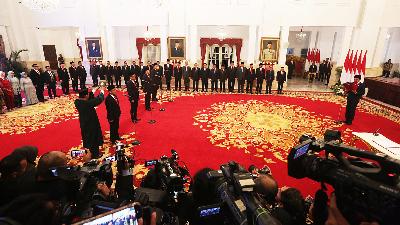
Two months before stepping down, Jokowi reshuffled the cabinet, selecting close allies of Prabowo Subianto.

The government continues with its plan to make vehicle insurance and third-party liability insurance compulsory. There is suspicion that insurance is used to collect money from the public.

Prabowo Subianto intends to form a cabinet of 40 ministers. This will result in a bloated bureaucracy and wasted public money.

Political parties are preparing names for potential ministers in Prabowo’s cabinet. They are eyeing strategic positions.

Prabowo plans to expand his cabinet to 40 ministries. Political parties are fighting over strategic ministries. President Jokowi is also intervening.

The situation in Gaza is getting worse for newborn babies and mothers giving birth.
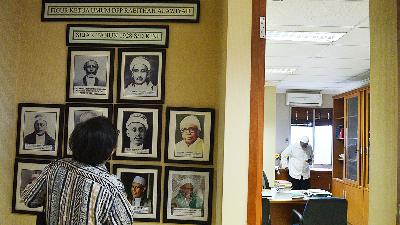
The Rabithah Alawiyah organization records the lineage of the Prophet Muhammad in the Indonesian archipelago. There are other approaches to verify the lineages of the habib.

The young man who claimed to be a descendant of the Prophet Muhammad illegally profited financially from the Rabithah Alawiyah website.

Part of the public reveres habib and sayyid as a form of adoration for Prophet Muhammad. A controversy arises regarding the lineage of Bani Alawi.

Rabithah Alawiyah is the only institution in Indonesia that keeps records of the descendants of the Prophet Muhammad. These days, people are less concerned about the details of their family lines.

Gerindra Party Executive Chairman Sufmi Dasco Ahmad gives his explanation about the preparation of Prabowo Subianto’s cabinet ministers.
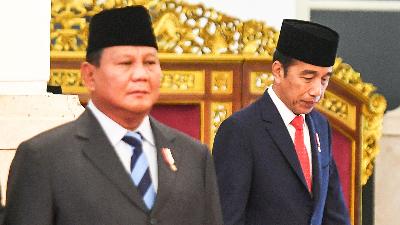
Prabowo Subianto already started to design the composition of his cabinet. There is a possibility that the number of ministers in Prabowo’s cabinet will increase.
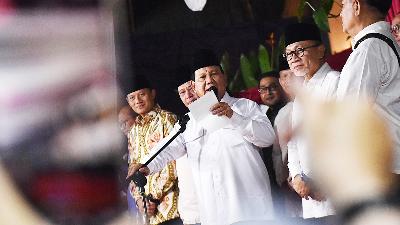
Prabowo’s cabinet is expected to be filled with many party cadres. Jokowi and other officials from the coalition of parties supporting Prabowo-Gibran already floated a number of names.

The PPP and NasDem have not expressed strong support for using the House’s right of inquiry to investigate alleged fraud in the 2024 elections. The Prabowo-Gibran camp is offering cabinet positions.
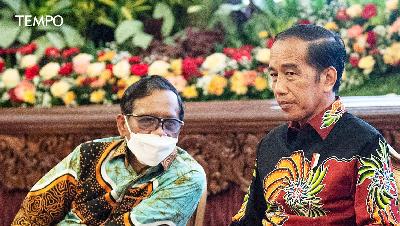
Instead of maintaining the ethics of statehood, electoral considerations are the main reason ministers are leaving or staying on in the cabinet. Pivotal was Mahfud Md’s case.
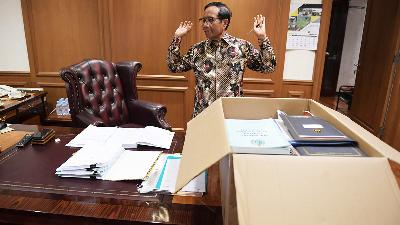
It is believed that Mahfud Md.’s resignation from the cabinet will not increase his electability. The prediction is that they could get more votes due to negative sentiment towards Jokowi.
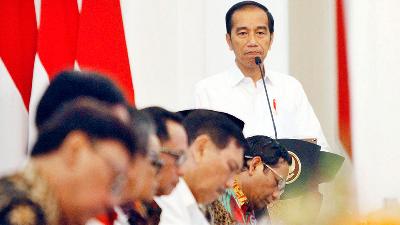
Mahfud Md. finally resigned from the cabinet. Several other ministers intend to follow suit because they are unwilling to support Jokowi’s dynasty.
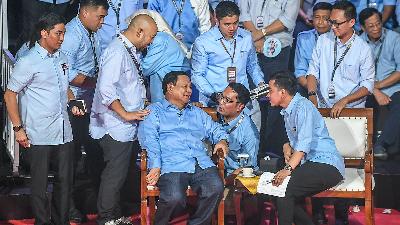
Prabowo and Gibran’s electability rates started stalling in November 2023. In several regions, support for Prabowo is eroded by the Anies-Muhaimin ticket.

What are the functions of the cabinet minister’s special staff?
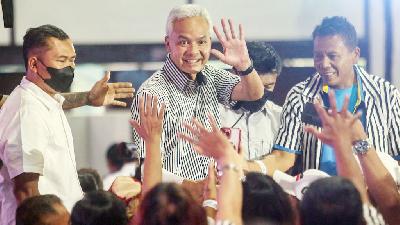
Ganjar Pranowo and Prabowo Subianto continue to make efforts to increase their electability. They are flooding social media with positive content.

The inclusion of Jokowi volunteers in the cabinet could easily be exploited for the political interests of the president. It is moving further away from a cabinet of experts.

Disputes in the forestry sector between companies and local communities continue. The situation undermines both legality and sustainability.

A group of people has taken the initiative to create programs to support people with disabilities in the workforce. Some provide advocacy while others connect workers with potential employers.

Many people with disabilities have trouble finding work. And those at work must face various hardships. Job opportunities for them at companies and government institutions still fall short.

Organizing the Sustainability Day is an effort by the Maybank Group to spread the various sustainable efforts that have been made by the company, while inviting everyone to practice sustainable efforts. #Infotempo

The health ministry has no need to be hesitant about legalizing cannabis for medicinal purposes. Legalization of the weed will solve many problems.

Marijuana’s legalization is believed to have the ability to boost Thailand’s revenues from the health and tourism sectors. The government is preparing industry-scale plantations.
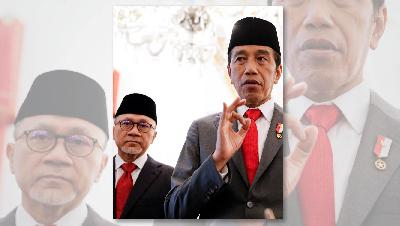
If the motive behind the cabinet reshuffle was to give political concessions, can we still hope that problems affecting the people can be resolved by replacing ministers?
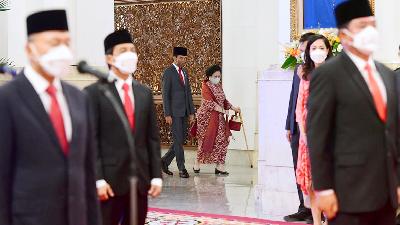
Jokowi appoints political party cadres as ministers and deputy ministers in the cabinet reshuffle. These politicians have been loyal to the President.

The Supreme Court upholds an appeal lodged by Muhammad Baihaqi, a person with disabilities from Pekalongan. The government must set an example of inclusive public services.

Without accountability, the police will lose public trust. People will suspect that the war on terror is being used to distract attention from other issues.
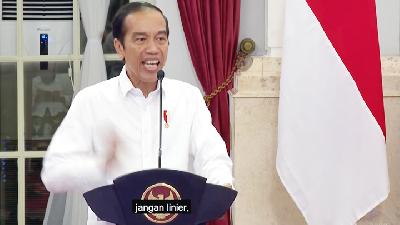
The president is unhappy with the performance of his ministers and banking institutions. There are plans to disband the Financial Services Authority and reshuffle the cabinet.

Lobbying by Golkar Party’s elite resulted in intervention by those in power. Their opportunistic habits from the past have preserved an oligarchy and political cartels.
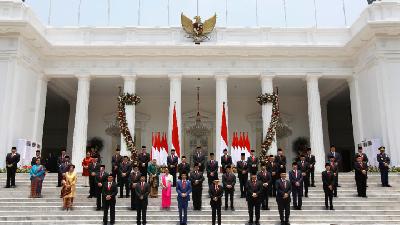
PRESIDENT Joko Widodo announced the names of 38 ministers and 12 deputy ministers who will assist him in his second term as president. Jokowi chose to reappoint several ministers who have been working with him since 2014. He again merges the research, technology and higher education ministry with the education and culture ministry; as well as the Creative Economy Agency—previously its own entity—with the tourism ministry. In the Indonesia Progress Cabinet, Jokowi embraces his contender in the past presidential election, Prabowo Subianto, as one of his helpers.
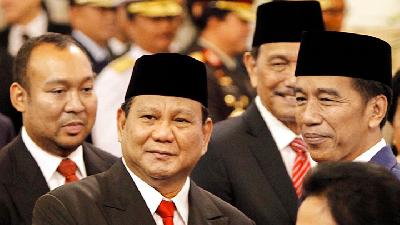
THE composition of the Indonesia cabinet that was announced by President Joko Widodo last week does not give much hope for Indonesia for the next five years.

B.J. Habibie (1936-2019), a humanist who laid the foundation of Indonesian democracy and taught the nation about the importance of having high goals.
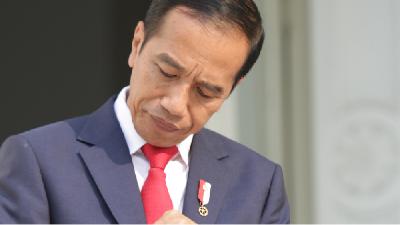
THE composition of the forthcoming cabinet is a gamble for president Joko Widodo. As the driving force for the realization of the elected president’s promises, the performance of the cabinet will determine how Jokowi is remembered in the future: as a successful leader, merely average or even a failure.
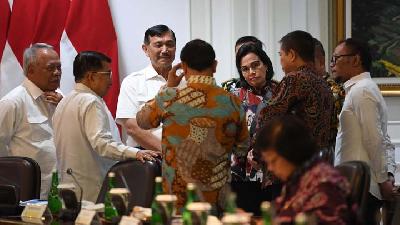
PRESIDENT Joko Widodo will be restructuring his cabinet. A number of ministries will be merged with other ministries, adopting new names. New ministries and institutions will also be formed. The President will be appointing deputy ministers for a number of ministries whose work areas cover a wide scope or ministries with big budgets.
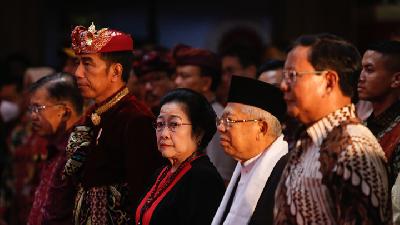
WHEN he met with cadres in the regions, Hamka Haq listened to their complaints about the quota for ministerial positions in the Working Cabinet for his party.
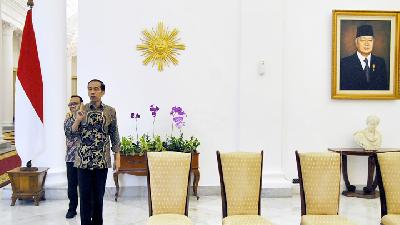
President Joko Widodo will be restructuring the cabinet in his second term in office. Some ministries will be merged, others are disbanded while new ones are formed. A young person will be appointed as minister of digital economy.

JOKO Widodo, who is likely to return to presidency, plans to reshuffle the cabinet toward the end of his first term.

The executions of Indonesian migrant workers in Saudi Arabia, without notifications to the foreign affairs ministry, are unjustifiable.

For the first time, four teams from the Arabian Peninsula are competing in the World Cup. This is a stepping stone for Saudi Arabia to develop its soccer business.

There were enthusiastic greetings for the King of Saudi Arabia, including from those with vested political interests.

Deborah Gabinetti is quick, gregarious, and emotivean immediate presence as soon as she enters a room. Yet she gives the impression of someone who is used to listening and observing. She will stop in the middle of a story to check your reaction, is not afraid to let pauses linger, tilts her head at you when curious to know what your take is on a situation and persists until she receives an answer.
When Tempo called Balinale's hotline to inquire about the festival, it was Gabinetti who answered the call. "This is Deborah. The director of the festival. Yes, I'm picking up calls," she said, laughing heartily, when asked who was on the other end of the line.

President Joko Widodo has consulted allies and friends about a second cabinet reshuffle. Some ministers may be replaced, others might be reassigned.

Last week, the banking sector began to publicize its first-quarter performance. In fact, some banks already held their annual shareholders' meeting. Although they are still optimistic of improved performance in this year's second half, the poor first-quarter results throw some doubt on whether the banking sector's recovery will actually take place this year.
In January 2016, data showed bank credit growing at just 10 percent from a year ago. With sluggish credit growth, the banks have been aggressively lowering their deposit faster than their loan rates. This explains the rise in the sector's net interest margin (NIM or the difference between deposit and loan interest rates) to 5.6 percent in January this year from 4.2 percent last year. However, this was not enough to cover the rising cost of non-performing loans (NPLs), due to slower economic growth. Sector-wide NPLs rose to 2.7 percent in January this year from 2.4 percent last year, while the sector's profitability dropped 5 percent over the same period. The worry is how far last year's weak growth will extend into 2016.

The incessant rumors about an imminent cabinet reshuffle have become very disturbing. President Joko Widodo should quickly make up his mind whether he wants to act on it or not to prevent a continuation of the current climate of uncertainty. It is the only way the government can function in a calm and focused way to achieve the goals it has set for itself.
The reshuffle has been discussed ad nauseam without any sign it will actually go ahead. What has emerged in the meantime are long arguments on its pros and cons and public squabbles among ministers, many of whom should instead be reflecting on their performance ratings distributed last December.

Saudi Arabia announced it had cut diplomatic relations with Iran on Sunday, January 3, following a protest at the Saudi Arabian Embassy in Tehran, which was triggered by the mass execution of 47 people, including Shia Muslim cleric, Nimr Al-Nimr. Al-Nimr was behind the anti-government protests in 2011.
In a press conference in Riyadh, Saudi Foreign Minister Adel Al-Jubeir said that Iranian envoys were given 48 hours to leave the kingdom. He further added that, "Saudi Arabia will not let the Islamic republic undermine its security."

When US President Barack Obama made a plea to the Muslim world in early December to confront the extremism in their midst, Saudi Arabia responded by announcing the formation of the Islamic Military Alliance two weeks ago.
"(The alliance) shows how keen the Muslim world is to fight this disease, which first affected the Islamic world, and then the entire international community," said Prince Mohammed bin Salman, Saudi Arabia's defense minister, in a press conference in Riyadh.

It is no secret that Vice President Jusuf Kalla has had differences of opinion with President Joko Widodo. Likewise, he has openly locked horns with other members of the cabinet, including with Coordinating Minister for Maritime Affairs Rizal Ramli who was appointed last August. Not surprisingly, the Jokowi-Kalla government often faces political tensions and problems of coordination.
Lately, Kalla seems to have lowered his political 'pressure'. In an interview with Tempo at his office, Kalla, who also served as vice president under President Susilo Bambang Yudhoyono from 2004 to 2009, said that differences among cabinet ministers had been resolved.

President Joko Widodo welcomed Saudi Arabia's Foreign Minister Adel bin Ahmed al-Jubeir during his visit to Indonesia on October 20. "Both countries are committed to strengthening our cooperative agreement," said Foreign Minister Retno Marsudi, adding that al-Jubeir's visit was a follow-up of Jokowi's visit to Saudi Arabia last September.
Retno said that as an outcome of the meeting, Indonesia and Saudi Arabia have agreed to pursue further cooperation in four different sectors: refineries, crude oil, petrochemicals and storage facilities. She said an Indonesian delegation would depart for Saudi Arabia in the next four weeks to secure the agreement.

Hana Salomina Hikoyabi is an activist from Papua, who uses her bureaucratic savvy to get things done. She was vice chair of the Papua People's Assembly during the 2006-2011 period and is currently the head of the Regional Development Planning Board for Jayapura Regency. Hana founded the tabloid Suara Perempuan Papua (Voice of Papuan Women), to publicize issues related to violence against women, the need to acknowledge people living with acquired immune deficiency syndrome (AIDS), for information on access to justice and the conservation of Papua's mega-biodiversity.
The tabloid has been influential in changing perceptions on gender in Papua, and she is not giving up on the idea that women should continue aiming for 30 percent representation in the legislature. For her unrelenting advocacy to give voice to the women's plight in Papua, she was presented with the 2015 SK Trimurti Award by the Indonesian Alliance of Independent Journalists (AJI) at the beginning of September.

Paulus Ronald Bogar was feeling happy late last July. His project '500 Names for NTT-Village Library' had racked up Rp53 million on the website, kitabisa.com. "I was so happy and moved," he told Tempo English two weeks ago. Ronald, who studies international relations at Padjadjaran University, is the Coordinator of the NTT Youth Project.
He realized that, at last, he would be able to fulfill the needs of his Village Library project, which had already established five villages in Sikka Regency, East Nusa Tenggara (NTT) Province: Ojang, Bangkoor, Poma, Dewa Wolo Dhesa and Nita. Since the program's inception he and his friends had badly needed funds for the purchasing of bookcases, tables, and other library needs.

The sensibilities and sense of humanity of the Arab states has rightly been called into question, with the wave of Syrian refugees. It is truly shameful to see wealthy nations such as Qatar, Kuwait, Oman, the United Arab Emirates and Saudi Arabia closing their doors tight to the Syrian migrants' suffering, as if these people were carrying the plague or leprosy and therefore must be kept away.

President Joko Widodo had good reasons to send Cabinet Secretary Pramono Anung, 52, to meet protesting labor union members last September 1. He is, after all, well-known for his negotiating skills. "Yes, that's my job. Anyway the President was having dinner with (an association of) minibus drivers," explained Pramono.
He was sworn in to his present position as minister in charge of cabinet affairs on August 12, replacing Andi Wijayanto. In addition to his main job, based on clear-cut regulations, the President has asked him to bridge relations between the Palace and political forces. "This is not just with coalition parties but also with the others," said Pramono, in a special interview with Tempo reporters Jobpie Sugiharto, Isma Savitri, Retno Sulistyowati and Sunudyantoro, at his office, last week.

A Malaysian palm oil giant controlling more than one-tenth of the commodity's global trade, has pledged to eliminate deforestation and human rights abuses from its supply chain, the latest in a torrent of sustainability commitments by industry giants under pressure from campaigners.
IOI Corporation, run by Chinese-Malaysian billionaire Lee Shin Cheng, will follow in the footsteps of its specialty fats subsidiary IOI Loders Croklaan, which announced its own policy in November last year.

Luhut Panjaitan has apparently quieted down since new President Joko Widodo declined to name him a minister. When Tempo asked to interview him last week, the retired general replied with only one word. "Watimpres," he said over the phone. Then he hung up.
It was a reference to Luhut's title in the new administration, as a deputy on the Presidential Advisory Council, a position known as 'watimpres', instead of the head of the president's office, as some had speculated. Andi Widjajanto, who was appointed secretary of Joko's working cabinet, did not explain Luhut's position. As for who would head the president's office, "The decision is with the president," Andi said after meeting Luhut in his office at the Wisma Bakrie building in Kuningan, South Jakarta.

President Joko Widodo reshuffled some ministries and formed new ones for his new cabinet. The ministries affected by the reorganization are Public Works, Public Housing, Tourism, Education, Forestry and Environment. Joko also formed a new coordinating ministry: Maritime Affairs.
Due to these changes, Golkar Party Chairman Aburizal Bakrie reminded Joko that the 2015 State Budget does not account for the new organizations, especially the new ministry. According to Aburizal, the 2015 State Budget has already been officially approved and allocated to ministries established during President Susilo Bambang Yudhoyono's term. "Thus there will be a problem in the usage of funds and in the implementation of his programs," Aburizal said.

PREDICTABLY, the struggle continues among people close to President Joko Widodo over the formation of his cabinet. He was warmly welcomed by a festive parade on the day of his inauguration on October 20, but Jokowi must now carry the hopes of many on his shoulders: a clean and professional government, resolute and impartial law enforcement, immediate economic improvements and policies that favor the ordinary people.

MANY Indonesians are disappointed with the proposed architecture of President-elect Joko Widodo's cabinet. Despite campaign promises, Joko said he would not reduce the number of ministries from 34. Of those, 18 would be headed by professionals in their fields and the rest by politicians from various parties. Ministries that will not be headed by politicians include Trade, Finance, State-Owned Enterprises and Energy. "It turns out his promise to downsize was not implemented," stock market observer Satrio Utomo said, adding that the market had hoped Joko's cabinet would include more professionals.
Transition Team Deputy for Cabinet Architecture Andi Widjajanto said Joko was ready to select names for his cabinet out of 40 people from various disciplines. The team is using public participation to form a list of candidates. Then a headhunter will sort out the names into three teams based on track records. Team One will be filled by candidates that have reached the top of their careers, while the two others will be filled by professionals and representatives from political parties. "Pak Jokowi will be focusing on Team One," he said.

TRAPPED between the desire to establish a professional cabinet and the need to increase support for his coalition in the legislature, Jokowi Widodo must act wisely and cautiously. He has said from the outset that he wanted a coalition without preconditions, no power-sharing with the parties supporting him. Hopefully, the statement that he plans to recruit 16 "party professionals" to fill ministerial posts-out of a total of 34-means he is doing just that. But a more pessimistic point of view is that Jokowi is having doubts about his own initial stance.
The term 'party professionals' is open to varying interpretations. He might mean professionals supported by political parties. But it is also possible that it is members or leaders of these parties that he wants to appoint to the cabinet. The 16:18 ratio of prospective ministers that are party members to professionals shows that Jokowi's cabinet is an improvement over that of Susilo Bambang Yudhoyono, which has 21 ministers from political parties. But it seems that the public will not see a significant change in Jokowi's administration.

THE speculation was answered on Monday evening last week. In front of the press, President-elect Joko Widodo and Vice President-elect Jusuf Kalla announced how many ministries will exist after they take office on October 20. "Thirty-four," said Joko in front of the office of his Transition Team in Central Jakarta.
Joko also revealed the number of politicians and professionals his cabinet would include, which had been the subject of endless speculation: "There will be 18 experts and 16 'professional' representatives from political parties." Transition Team Chief of Staff Rini Soemarno and her deputies-Andi Widjajanto, Anies Baswedan, Hasto Kristiyanto, and Akbar Faizal-were also present at the announcement.

THE home of businessman Soetrisno Bachir in South Jakarta, was enlivened by the banter among the guests on the night before the end of Lebaran, last July. Their chat in a room adjacent to the swimming pool was about candidates for cabinet positions. Joko Widodo and Jusuf Kalla, who were supported by Soetrisno, a former chairman of the National Mandate Party (PAN), were officially declared the winners of the presidential election by the General Elections Commission (KPU). "Rizal would make a good foreign minister, why would he be considered for the labor minister," asked Soetrisno, which made his colleagues burst into laughter. He said he preferred to take care of people. The guests responded by saying, "Ok, Pak Soetrisno should become the coordinating minister for people's welfare."
The Rizal in question is Dr. Rizal Sukma, executive director of the Centre for Strategic and International Studies (CSIS) and chairman of the foreign relations board of the Muhammadiyah organization. He prepared the material on foreign policy for Joko Widodo during the presidential debates.

ON the night of October 20, 2004, President Susilo Bambang Yudhoyono announced his new cabinet, after delaying it three times. It was nearly midnight when, accompanied by Vice President Jusuf Kalla, he announced the names of his 36-member cabinet, comprising three coordinating ministers, 18 departmental ministers, 13 state ministers and two minister-level officials.
Yudhoyono called it the United Indonesia Cabinet. According to Jusuf Kalla, it was the result of compromises reached with various parties. "It was changed many times. Some changes were made at the last minute," Kalla told Tempo three weeks ago. Kalla was recently elected as Joko Widodo's vice president in the recent presidential polls.

In 1961, the Russian poet Yevgeny Yevtushenko wrote a poem about the people murdered on the edge of a bleak ravine to the northeast of the Dneiper river:
I am
each old man
here shot dead
I am
Every child
Here shot dead.
Twenty years before this, at that ravine in Ukraine, at Babi Yar, around 34,000 Jewsincluding women, children and elderlywere murdered by German soldiers in just two days, September 29-30, 1941.
Yevtushenko is not Jewish; the poem Babi Yar says "In my blood there is no Jewish blood." But he claims that people are forgetting the brutality of what happened thereand along with it, other unacknowledged brutality of the past. Yevtushenko wrote his poem after Stalin's death, when people could read this massacre as a reminder of the cruelty that happened in their own pastjust as we in Indonesia can read it with similar memories.

A big-time domestic aircraft project spearheaded by Indonesia's private sector is entering the design stage. The son of former president BJ Habibie, an aviation expert, is part of the endeavor.

Midwives play a key role in issuing birth certificates of babies destined for adoption by childless couples.

The legal process involving one particular fatal car crash must be handled professionally. It is time the state makes it mandatory for car owners to carry third-party liability insurance.

Bacharuddin Jusuf Habibie does indeed have above-average intelligence. Intellectual brilliance made Habibie a famous aeronautics expert. It is also what impressed President Suharto, who called Habibie home to Indonesia to develop Indonesias aeronautics industry. Habibie went on to be close with Suharto.After Suhartos downfall in May 1998, Habibie replaced him as president. However, after being installed into office, his close relationship with Suharto shattered. Some of the policies of his administration, especially the loss of East Timor, were controversial. Today the aero industry he pioneered is languishing, even to the brink of bankruptcy.

In various ways, ministers are trying to avoid the dismissal list of the upcoming cabinet reshuffle. Most of them are too late.

President Yudhoyono received the year-end evaluation report on the cabinet’s working programs. Two cabinet ministers scored poorly.

Religious enthusiasm in Indonesia promotes the growth of majelis led by a number of habib, descendents of the Prophet Mohammad. They teach religion using morals and the love for Prophet Mohammad, denying allegations that Islam was introduced here through violence.

The President appoints three more deputy ministers, making his cabinet the largest since the New Order era.

The second United Indonesia Cabinet was formed according to a complicated matrix of representation. What is clear, Hatta Rajasa played a key role.

The new cabinet ministers should be selected not on the basis of political parties’ pressure or short-term interests. The following is Tempo’s version of professionals who should sit in the 2009-2014 presidential cabinet.

Artist Haris Purnomo features babies swathed in cloth, tattoos covering their faces and bodies. A picture of a child’s suffering.

Khairy Jamaluddin, Abdullah Badawi’s son-in-law, and former Minister Syed Hamid Albar are not in Najib Razak’s Cabinet. Why?

A number of towns in Indonesia are making every effort to anticipate the spread of rabies. Bali is a designated area experiencing an extraordinary event—an outbreak of rabies—and hundreds have already died of the disease in East Nusa Tenggara.

The President has every right to change his cabinet. However, the reasons for it must be clear and rational-not just communication problems.

B.J. Habibies book, Decisive Moments, has started a new polemic. Lt. Gen. (ret) Prabowo Subianto demands that the author revise certain sections. Habibie refuses to do so. Some generals have commented on the 535-page book to Tempo.

Many things can be said of Hasnan Habib, a former general who passed away last Thursday at the age of 79. He is mostly known for his strategic initiatives.

The second chapter of the United Indonesia Cabinet is not much different from the predictions. The choice of Erman Soeparno suggests that SBY is attempting to embrace the Gus Dur camp in the PKB.

There have been repeated calls urging the president to make some cabinet changes. Golkar has asked for seven ministerial postings.

The case against former Environment Minister Nabiel Makarim is likely to fall flat. Police say there is no evidence he is lying.

Emphasizing merits and ignoring politics, Tempo editors imagine a new presidential cabinet.

The Yudhoyono camp hints at a potential cabinet formula and speculation grows over the his and Megas ministry plans.

The government is considering leasing out the country's uninhabited islandsto the dismay of environmentalists.

There is a craze among Indonesian moviegoers for (cinema and TV) films peppered with elements of comic mysteries, mysticism and horror, ranging from the box office hit Jelangkung to a mixed repertoire of “mystery stories” now flourishing on all TV channels. Indonesia’s mystery and horror films owe their presence to The Teng Cun, who introduced films of this genre to the Indonesian audience with his Doea Siloeman Oeler (Two Snake Ghosts). Later on, The, a Chinese-Indonesian born in Batavia, Jakarta’s erstwhile name, directed films in the same category such as Siloeman Babi Perang Siloeman Monjet (The Ghost Pig Fights the Monkey Ghost, 1935), Anaknja Siloeman Oeler Poeti (Son of the White Snake Ghost, 1936), Lima Siloeman Tikoes (Five Rat Ghosts, 1936) and Tengkorak Hidoep (Living Skeleton, 1941). How do these films differ from the horror films of the 1970s that gave the accolade of “Queen of Horror” to actress Suzanna? How do they differ from the horror films of the 1990s, which were inclined to exploit sex scenes? Also read TEMPO’s exclusive interview with Suzanna, the reclusive and enigmatic actress.
Arts & Culture Tuesday, February 18, 2003 Edition

The Jakarta High Court overruled a verdict sentencing BI Governor Sjahril Sabirin to three years in prison. It declared Sabirin not guilty, despite his knowledge of the controversial Bank Bali fund disbursement.

A cabinet of professionals and bureaucrats. In the end the military did better than most of the political parties in Megawati's team.

Hamzah Haz has a good chance of becoming Megawati's vice-president. And to keep the politicians satisfied, the cabinet is being fattened up again.

The Cabinet will again be changed. But the offer fell on deaf ears, and Wahid inches closer to impeachment.
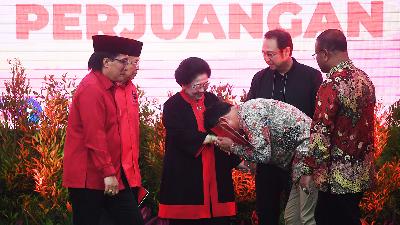
The PDI-P will be nominating Anies Baswedan in the Jakarta gubernatorial election. A popular candidate against Jokowi’s coalition.

The opportunity for Anies Baswedan to contest the Jakarta gubernatorial election is slipping away after the coalition of parties supporting him fell apart. There is a guerrilla from the Palace.

An exclusive Tempo interview with Anies Baswedan regarding his chances to run in the Jakarta regional head election.

Jokowi and Prabowo’s coalition are maneuvering to thwart Anies Baswedan’s candidacy in the Jakarta regional head election. Cabinet posts are being offered as inducements.

Chances for Anies Baswedan to run in the Jakarta regional head election are beginning to open up. A number of political parties support Prabowo Subianto intend to nominate Anies.

Thirteen-year-old Afif Maulana was found dead under a bridge in Padang, West Sumatra. He had allegedly been tortured by the police.

The number of Indonesian umrah minor pilgrimage travelers grows during the fasting month of Ramadan. The nation’s umrah economic potential has not been fully harnessed.

A defendant of the Supreme Court justice bribery case is allegedly subjected to extortion by someone claiming to represent the leadership of the KPK. The name Firli Bahuri is also implicated.
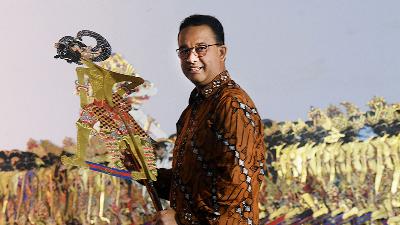
Anies Baswedan talks about the campaign. He admits there are talks with the Ganjar-Mahfud team.

The claim that the Gunung Padang site is the oldest pyramid in the world is strongly challenged. A collaboration of researchers from around the world is needed.
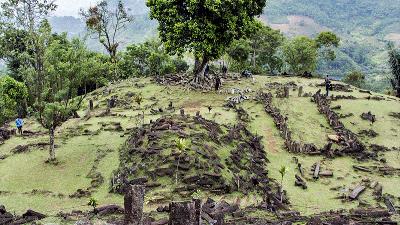
Foreign archeologists doubt the site of Gunung Padang as the world’s oldest pyramid. A journal publisher is going to investigate.

Moh. Wijdan, Head of Ketapang Jaya village, Ketapang, Sampang, East Java, replies to Pressure from the Police and Prosecutors article.

Anies Baswedan is campaigning aggressively through TikTok. It is forbidden to talk about politics and campaigns.

Several high-ranking veterans formerly supporters of Jokowi and Prabowo switched their allegiance to Anies Baswedan. Several officers held disappointment.
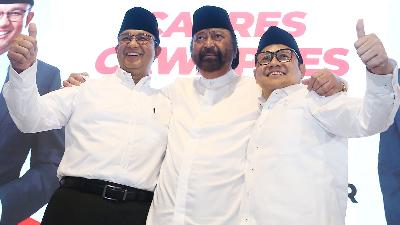
Anies Baswedan choses Muhaimin Iskandar to be his vice-presidential running mate. Agus Harimurti Yudhoyono is eliminated in the final turn.

The concept of Kampung Madani is to optimize the business and economic potential of the region. #InfoTempo

A family of Sumatran tigers died after being caught in snare traps in Aceh. With a population of about 600, this endangered wild animal is threatened by poaching, loss of habitat, and conflict with humans.

Poaching produce in the North Natuna Sea is not only triggered by economic need. According to the Director of the Fleet Monitoring and Operations of the Marine and Fisheries Resources Directorate-General in the Maritime Affairs and Fisheries Ministry, Pung Nugroho Saksono, a conflict similar to the Sipadan-Ligitan case between Malaysia and Indonesia should not be allowed to recur.

Corruption Eradication Commission (KPK) investigator, Novel Baswedan, has doubts about his alleged assailant Brig. Rahmat Kadir Mahulette’s statement, calling him a traitor.

MEDAN Mayor Tengku Dzulmi Eldin’s alleged bribery case has roped in a number of parties, from bureaucrats to businessmen.

THE ivory hornbill or rangkong is a symbol of courage and bravery for Dayak community in Kalimantan. The bird is also considered a protector, and acts as the bridge which connects the souls of their ancestors with the Dayaks. Despite this, in the past three years, the population of the ivory rangkong has depleted alarmingly. In 2015, international conservation organizations announced its status as critically endangered.
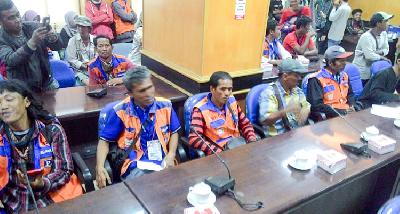
Parking attendants in Makassar were given paralegal training by the Makassar Legal Aid Institute. The program aims to improve legal awareness and embolden participants to fight corruption.

THE Civil Society Coalition has worked with Change.org to launch a petition demanding President Joko Widodo to form a joint fact-finding team (TGPF) to investigate the attack using acid against Corruption Eradication Commission (KPK) investigator Novel Baswedan.

Sartono Kartodiredjo’s dissertation Pemberontakan Petani Banten 1888 (The Peasants’ Revolt of Banten in 1888) and Catatan Harian Imam Samudra (Imam Samudra’s Diaries) were two texts that significantly influenced Jompet Kuswidananto’s work On Paradise, exhibited at the Museum of Contemporary Arts, Grand-Hornu, Belgium.

Organic coffee farming in Kiadan Plaga is the main source of income. It is also a vehicle for the village’s brand of ecotourism.~

Rizieq Syihab, charged in a pornography offense, did not show up at his scheduled questioning at the Jakarta police headquarters on April 25. He said he wanted to travel to Mecca, Saudi Arabia, to perform the lesser pilgrimage (umrah). This Grand Imam of the Islam Defenders Front (FPI) promised he would be present for questioning upon returning from the Holy Land in mid-May. However, the post-Ramadan fasting month holiday has passed and he has yet to return to Indonesia.

Anies Baswedan took advantage of the final week of the campaign to emphasize his rejection of land reclamation work on the north shore of Jakarta. On Wednesday last week, Anies, who is running for the office of the Jakarta governor, endorsed by the Gerindra Party and Justice and Prosperity Party (PKS) went to the dock in Cilincing, North Jakarta. He took part in the parade with the theme "Fishermen Reject Land Reclamation."
There were 150 ships there, each carrying 10 fishermen, which sailed in a convoy on Jakarta Bay, from Kalibaru dock to Cilincing. These fishing boats visited Island G, an island where work had once stopped, which is being worked on by the Agung Podomoro Land company. They put up a banner there which read "Reject Land Reclamation."

Friday last week was a busy day for 47-year-old Anies Baswedan, who began his day's activities from early morning. His schedule was full and it did not end until nearly midnight. "I haven't slept much," said Anies.
That day, Anies, the former education and culture minister, was selected a candidate in the Jakarta gubernatorial election, by the Gerindra Party and the Justice and Prosperity Party (PKS). His running mate is Sandiaga Uno, a Gerindra member and businessman. There was a series of events he had to attend following his nomination: the public declaration of his candidacy, registration at the Jakarta General Elections Commission (KPUD) and political meetings. At the end of that Friday, Tempo reporter Prihandoko had a chance to interview Anies about his nomination

THE four big mammals that have always been the focus of World Wildlife Fund (WWF) Indonesia, according to Arnold Sitompul, are tigers, orangutans, elephants and rhinoceroses. It is not just because they are endemic to the islands of Sumatra, Java and Kalimantan. The animals are listed by the International Union for Conservation of Nature (IUCN) as critically endangered. "These species have always been our main concern because they are endemic to Indonesia, and so they've always been our priority," Arnold told Tempo.
Out of the four endangered mammals, the most threatened are the Sumatran rhinos (Dicerorhinus sumatrensis), of which only about 300 are left in the wild. Meanwhile, the population of Sumatran elephants (Elephas maximus sumatranus) plummeted by 50 percent in less than 10 years. Arnold recently spoke to Tempo English reporter Amanda Siddharta on WWF Indonesia's efforts to conserve these iconic beasts. Excerpts:

The huge education budget20 percent of the total state budgetdemands a significant improvement in the quality of the national education system, something that Indonesians have been yearning for years. Now, it is up to Education and Culture Minister Anies Baswedan to respond to those demands.
The first step that Anies has started is publicizing all data on public education. The Education Balance Sheet publication contains information that until recently was not available to the public, such as the number of students in schools, the proportion of students to teachers, the number of damaged and broken-down schools, the quality of teachers based on teacher competence evaluations, the different education budgets between national and regional budgets, the budget allocation per student and the number of accredited schools.

This is the story of death. It is begun with somebody's death and ends with your own death. Yes, your death. No need for surprises," Faisal Oddang opens his story in his maiden novel Puya ke Puya. Death is the frame of the whole narrative, binding the subplots throughout the 218-page novel.
Yet, death here is not described in fear or anxiety. Faisal sets it with the background of the Toraja community that views death as something intimate. "Most Torajans celebrate death and keep it as close as possible in their memories," writes Faisal.

It is increasingly clear that the charges against Corruption Eradication Commission (KPK) investigator Novel Baswedan were mostly fabricated. The National Ombudsman found suspected fraud in the police investigation. The prosecution's case against Novel, concluded the Ombudsman, should not even have qualified for a court hearing.
Irregularities were first suspected when a 2004 resolved case involving Novel was regurgitated. He was, at the time, posted in a Bengkulu district police precinct and charged with allegedly allowing his subordinates to torture some bird-nest thieves. The case should have been closed after Novel was given a strong warning that same year. Unfortunately, the police dug it up when Novel, as a KPK investigator, exposed the corruption inside the National Police traffic division.

After the noon prayers, Irzal Rakhmadani, 24, packed his things in a rucksack and went out. Two items he never goes without are his stethoscope and sphygmometer. He would ride on his motorbike to the office of the World Wild Fund for Nature (WWF) in Palangkaraya, Central Kalimantan, three kilometers away. There, he would treat people suffering from the effects of forest fire smoke around Palangkaraya. In 2015, he treated some 1,000 patients.
In mid-September, Irzal and his colleagues visited a camp for workers who had been laid off by an oil palm company. Fifteen volunteers of Earth Hour Palangkaraya had gathered to help the smoke victims there. Irzal saw something that distressed him. About 300 people were crammed into a 5x15 meter barrack. Because there was not enough room, tarpaulin tents had been set up outside the barracks. People lived alongside chicken and their pet dogs.

ON the first day that Anies Baswedan began his job as minister for culture and elementary and secondary education a year ago, he knew there would be piles of work ahead of him. Among the many issues that needed to be sorted out was the scarcity of teachers in Indonesia's remote areas. Yet, statistically, there should have been enough teachers to go around. The student-teacher ratio is around 16 to 1. "That's an excess, while in South Korea, the ratio is 30 to 1. Ideally it should be 25 to 1," said Anies, admitting that the problem in Indonesia was one of unequal distribution. In some places such as Papua, the ratio dropped significantly to 75 students for every teacher. So, in May this year, the education ministry initiated the Guru Garis Depan (Frontline Teachers ) program to address the shortage of teachers in the outer parts of the country. So far, 798 teachers have been sent out to teach at 28 regencies. Next year, the number is expected to increase to 3,500. Anies discussed the Frontline Teachers initiative with Tempo English reporters Sadika Hamid, Syari Fani and Amanda Siddharta. Excerpts:

THE Energy and Mineral Resources Ministry has an ambitious plan for next year: raising the budget for the development of renewable energy by 10 times. "The future of Indonesia's development depends on seeking and building renewable energy. We can no longer rely solely on fossil fuel energy, which is bound to become scarce," said Dadan Kusdiana, director of the ministry's section on bio-energy.

A strain of wheat developed by researchers at the Andalas University School of Agriculture in Padang, West Sumatra-the Galur SO-3, or GURI 6 UNAND-has been identified as one of four superior varieties of wheat by the Cereal Plant Research Center last November.

Rice, rendang beef stew, jackfruit curry and many kinds of sambal (chili paste) sit in the front lanjar (guestroom) of Etek Nuraini's traditional rumah gadang house in Nagari Sumpur, in the Tanah Datar regency of West Sumatra. It is early in the month of February. Some 40 guests have gathered, including village elders and West Sumatra Governor Irwan Prayitno. Guests sit on the floor, eating side-by-side. Prayers are recited for the safety and wellbeing of those who will inhabit the house. Family photos hang on the wall. Windows are left open to let sunlight in.
From the vantage of the dining area, the house's spacious interior is in clear view. Six jua (Cassia siamea) pillars grace the building's 17-meter-long sides. Jua, a type of ulin ironwood, is extremely durable: once dry, its impossible to cut it down to size. The walls, meanwhile, are made of surian (Toona ciliata), and floors from bayur (pterospermum javanicum) tree trunks.

Forty young men strain and groan, taut muscles shining with sweat as they haul a jua tree (Cassia siamea) out from a ravine near Singkarak Lake, West Sumatra. The trunk is 11 meters long and will be used as the main pillar in a rumah gadang (traditional Minangkabau house). The house is being built for the heirs of Etek Siti Fatimah in the hamlet of Nagari, Sumpur village, Tanah Datar regency. Etek is what locals call an aunt, or a respected female figure.
The men take turns pulling the tree up and out of the gully. Shortly after noon, they reach the top. After clearing another small rise they toss the trunk down the other side, watching it tumble downhill.

PHOTOGRAPHS of elementary school students hang on the walls of the Ki Hajar Dewantara Building of the Elementary and Secondary Education and Culture Ministry in Jakarta. Most of them show children in remote areas, wearing shabby uniforms but genuine smiles on their faces. The photographs were put up at the request of the new minister, Anies Baswedan, who asked that they be hung everywhere, including in all meeting rooms. "So that when we meet, their faces will remind us that we work for them," said Anies, in his office last week.
Barely two months into his new assignment, Anies has created a buzz in Indonesia's education sector. He changed the function of national school examinations from determining a student's passing grade to merely a tool to measure the quality of education. A recent bombshell was when Anies halted the Curriculum 2013 and reverted to the Curriculum 2006 on December 6. He rejected the new curriculum because he noticed that teachers and schools were not ready to use it. "It's like being told to suddenly switch to an iPhone when you're used to using BlackBerry," Anies explained.

His name is Sekarpandan. He is short, with a huge behind. In Cirebon style wayang kulit, he is one of the nine clown-retainers who accompany the five Pandawa.
Sekarpandan got his bodily form after taunting Semar, who wanted to marry Sekarpandan's older sister Sudiragen. In the fight that ensued, Sekarpandan lost and was thrown into a clump of pandanus, immediately changing form: he became a replica of the person he had been taunting. Also in character.

PERHAPS he was born with a gun in his hand. At the age of 13, Benny Moerdani fought as a member of the military academy cadets. He nearly died when Dutch gunfire destroyed his rifle barrel. Fragments flew into his face, causing him to bleed profusely.
Without being trained as a paratrooper, Benny once jumped from an airplane over Pekanbaru to win back the Caltex oilfield which had been taken over by rebels from the Revolutionary Government of the Republic of Indonesia (PRRI). During a different assault in Padang, his parachute failed to open. The cord wrapped around his leg, and his body slammed against the plane's fuselage. Fortunately he was able to use his reserve chute. With his leg in a cast, he insisted on going to the battlefield.

A national research team has discovered ancient buildings and artifacts at the Mount Padang archaeological site in, Cianjur regency, West Java. The team's deputy chairman for geology, Danny Hilman Natawidjadja, said they had found a 22-centimeter-long stone rod on the mountain's southern slope, about two or three meters below the surface. The rod has pores and magnetic characteristics that attract it to metal. "It resembles Harry Potter's magic wand, which is fit for gripping," Danny said last week.
Other finds included knife-shaped metals, metal waste and burned soil with stacks of stones beneath. Based on laboratory tests, the burned residual materials have been in the location since 5,200 BC.

FOR almost a year, Hamdan Zoelva has only managed to sleep five hours a day. As the chief justice of the Constitutional Court he has had to bear the consequences of his predecessor Akil Mochtar's actions. Last year Akil was arrested, tried and sentenced to jail by the Corruption Eradication Commission (KPK). "Many people don't trust the Court anymore," said 52-year-old Hamdan.
Akil was guilty of accepting bribes from regional chief executives whose elections were in dispute. He was arrested in early October 2013, in the process of receiving money from Hambit Bintih, district chief of Gunung Emas. The case shook the Court. When Hamdan took over, public trust in the judiciary was at its lowest.

CONSTITUTIONAL Court Chief Justice Hamdan Zoelva turned red and his voice rose one decibel higher as he presided over the lawsuit submitted by the Jambi-based National Democrat Party. Two of the three witnesses had given conflicting information. When they were questioned further, they had no valid data. "It was very clear they were making it all up," Hamdan told Tempo.
The inaccurate testimony, according to Hamdan, was one among many problems in the court proceedings looking into disputes arising out of the recent legislative election. Some 700 cases submitted by political parties and legislative candidates were pending, with only three weeks to go before the deadline on June 30. "This week we will evaluate the cases so that a week before the deadline, all is in place."

The government has appointed PGN and Bakrie to complete the Kepodang-Tambak Lorok gas pipeline project. PLN has missed out on Rp3 trillion in savings.

On the eastern part of Sumba Island, Mbatakapidu village chief Jacob Tanda is synonymous with bountiful harvests. He succeeded in turning around a perennial food shortage into abundance and resilience, thanks to his innovative farming ways. He urged his villagers to plant 10 kinds of crops and to re-use the traditional barns to store food. He persuaded women active in the local Community Welfare Program (PKK), to carry out a 'love your local products' campaign. In just four years, he altered an impoverished village into a bountiful, resilient community. Tempo reporter Syari Fani flew to eastern Sumba to report on this success story on the occasion of World Food Day on October 16.

A cross-disciplinary team of scientists is studying a controversial archeological site: Mount Padang. Is it true the site is 10 times larger than Borobudur?

This is a portrait of how things have changed in the first elite neighborhood in the Dutch Indies. The area in question was formerly called Nieuw-Gondangdia. Later its name was changed to Menteng. This is where the wealthy lived, from top government officials and governors to ambassadors and businesspeople. Over the years, however, its beauty has faded. It has grown in an irregular fashion, due to the inconsistent application of city regulations, as well as its residents' lack of concern for the environment.
On this year's anniversary of the city of Jakarta, which coincides with Menteng's 100th anniversary, Tempo attempts to write extensively about Indonesia's first modern tropical residential area. This is where the Indische (Indies) architectural style originated. Not many buildings of this style exist today. Now it is a crowded, polluted area, used by motorists avoiding carpool roads. Menteng is a typical example of Jakarta's muddled zoning regulations.

In the village of Lendang Nangka, East Lombok, residents have attained self-sufficiency in their clean water supply. In addition to receiving an award for their efforts, the villages water supply has made it easier for residents to conduct their business.

The month of Ramadan (fasting) will end with the Idul Fitri holidays, a cause for joyous celebration. Young and old, the high and the low, will come together in a new beginning, marked by day-long feasting and fun. But there will also be a sobering moment of spiritual reconnection, of forgiveness and joint prayers, giving thanks to the greatness of God Almighty. At this joyous time, Tempo English Edition presents a special photo essay of Ramadan celebration in eastern Indonesia.

Artists from Indonesia used various actions to capture the attention of audiences in Berlin. Sundanese language was not an obstacle when it appeared as a performance.

Located in the middle of the World Coral Triangle, Indonesia plays an important role in determining the fate of the tuna, the highly popular food fish that is slowly but irrevocably diminishing from the earth’s oceans, no thanks to years of excessive fishing. Processing plants can no longer meet fish production capacity, fishermen must sail farther out to sea for their catches yet exports are declining. Can government regulations bring back the endangered tuna? A special report by the Tempo English Edition team.

The winner of the Rancage Literary Award was announced. Ajip Rosidi has begun to pass on the judging of Sundanese literature to his colleagues.

The Special 88 Detachment has been deployed in pursuit of the Medan Bank CIMB robbers. They are suspected of having links to former GAM members and other groups.

The high bovine mortality rate drove researchers at Nusa Cendana University to create a supplement that fattens cows and makes them resistant to disease.

How will corruption eradication fare in 2009? The optimistic will reply: “full of challenges”, while the pessimists are bound to say: “dismal”. We prefer the word “endangered”.

Lombok’s Sasak Muslims enjoy unique traditions during Ramadan.

Tan Deseng is recognized as a skilled Sundanese ethnomusicologist. He set up a workshop with ethnic-Chinese students who love Sundanese culture.

The Cendana Axis
The Ups and Downs of the Cendana Family
After Suharto stepped down, the range of business activities as well as the wealth of the Cendana family seemed to decline. But the sons and daughters of the former president still hold key positions in a number of corporations.

The Medan District Court has rejected Adelin Lis’s defense. Forestry Minister Kaban will be presented as a witness.

Researchers find pandanus (screw pine) with potential similar to buah merah on the Island of Yapen, Papua.

The grandson of former President Suharto, Danny Indra Rukmana, married celebrity Lulu Tobing. A lavish wedding was held.

THE life rhythm of this youth suddenly changed in mid-July. He is now spotlighted, photographed, interviewed and gets to meet all kinds of people. Jonathan Pradana Mailoa is receiving praises galore because he is the shining star in a nation that is going through so much darkness: earthquakes, floods, famine and that endless disease called corruption. Indonesias reputation went up a notch through the brilliance of this 16-year-old, when he became the absolute winner of the 37th International Physics Olympics, held in Singapore and participated in by 86 countries.

The World Cup ended last Sunday, but people are still talking about soccer. Not Italys victory over France, but the duel between Zinedine Zidane, the captain of the French team, and Marco Materazzi, the Italian back.

LAST month, the Philippine government began identification of Indonesian migrants in Mindanao. They were offered a choice of repatriation to Indonesia, legalization or naturalization. Legalization allows the immigrants to stay in the Philippines and retain their Indonesian citizenship while naturalization provides the migrants with full Filipino citizenship. Most of the migrants came from the islands of Sangihe and Talaud in northern Sulawesi. The forefathers of these Indonesians, who have since taken Philippine citizenship, arrived in the southern Philippines in the 15th century. Locally called the Sangil, they considered themselves natives of Mindanao Island, although they spoke a language originating in Sangihe. Tempo correspondent Verrianto Madjowa traveled to Mindanao last September to observe the lives of the Indonesian migrants and filed this report.

Last week, Siti Hardijanti Rukmana was nominated PKPBs candidate for the 2004 presidential election. What is the extent of preparations by the Cendana family?

Like Malin Kundangthe folklore character who disowns his own motherYLBHI once fought the Jakarta City administration, which played a key role in establishing YLBHI and funding its first years of operation.

Even before the verdict handed down in The Hague last Tuesday, Malaysia had long been occupying Sipadan and Ligitan. TEMPO journalist Wenseslaus Manggut, who recently traveled to the islands, was unceremoniously told to leave in no uncertain terms by the Malaysian Police.

While a fugitive, Tommy Suharto often came to the family compound on Jalan Cendana. A long-time employee now tells TEMPO how he eluded capture.

The High Court is investigating six Medan District Court judges on charges of accepting bribes. However, they have only been suspended from duty pending further inquiry.

Semen Padang has rejected the governments wish to replace the companys board of directors. The reason for this was that financial performance was improving. Whats going on?

Expanding Padang restaurants apply a variety of business models to produce a remarkably consistent cuisine.

The planned sale of Semen Gresik-Padang-Tonasa has become extremely complicated since the West Sumatra DPRD and local government took over Semen Padang.

Surprise! I Putu Gde Ary Suta has been appointed chairman of IBRA. Can he win public confidence, bearing in mind he used to be close to the Cendana family?

This is the testimony of those involved in a 1998 bomb scare in Medan. They say they were obeying orders from an intelligence officer.

Omar Dani's Plea offers up a new fact regarding Bung Karno's presence at the Halim Perdana Kusuma air base. It's another piece of information from an actor with a role in history, muzzled for 30 years.

Two journalists investigate the Mindanao rebellion. What was the role of President Abdurrahman Wahid in negotiations between the Philippine government and the Salamat Hashim group? Why were they inspired by the liberation of Timor Leste?
Independent journalism needs public support. By subscribing to Tempo, you will contribute to our ongoing efforts to produce accurate, in-depth and reliable information. We believe that you and everyone else can make all the right decisions if you receive correct and complete information. For this reason, since its establishment on March 6, 1971, Tempo has been and will always be committed to hard-hitting investigative journalism. For the public and the Republic.